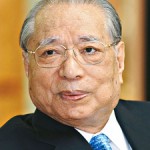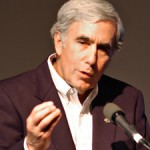Archive for the ‘North and South Korea’ Category
The Axis of Evil
By Johan Galtung
Do you remember the Axis of Evil – Iraq-Iran-North Korea?
George W. Bush, or his speechwriter rather, concocted that axis in 2002 as focus for a global war on terror. The key term is “evil”–not “enemy”, “hostile”–the connotation being “possessed by Satan”. The proof is opposition to a USA chosen by God, as God’s Own People, as “In God we trust”. To exorcise Satan only violence works.
In 1953 North Korea under Kim Il Sung did not capitulate to the USA, only cease-fire, the first US non-victory since 1812. Very evil.
In 1978-79, Iran, by the Khomeini Islamic revolution, decolonized Iran from US dominance and evicted the shah, who had been installed by a US-UK (CIA-MI6) coup in 1953; in fact undoing 1953. Very, very evil.
On 17 May 1987 Saddam Hussein, used by the USA to fight Iran with no gains for Iraq, fired on a US vessel (USS Stark incident). Very, very, very evil.
However, for a USA, never questioning bringing US style democracy and US free market to all countries in the world, this was not seen as others having their own goals. It was seen as exactly that, evil. Read the rest of this entry »
Pluses and minuses of Obama’s foreign policy
By Jonathan Power
So Putin on Monday met Obama. They are going to cooperate against ISIS, the world’s worst problem. President Vladimir Putin says we should not be surprised to see Russian jets working cooperatively – even coordinating – with the US on missile attacks.
Even with both powers working in tandem it will be uphill work. ISIS has attracted over 30,000 foreign fighters, according to a UN Security Council report. At least 2,000 from Russia and ex-Soviet territories are in their number. (In contrast to Russia the US is more threatened by domestic, non-Muslim, terrorists than Muslim extremists.)
Will rapprochement over Syria and ISIS wind the clock back to the benign US-Russia relationship that was begun with President Barack Obama’s early “re-set” which led to, among other things, a significant agreement on reducing nuclear arms? Read the rest of this entry »
The Korean peninsula: A view of the future
By Johan Galtung
Seoul
There was a big conference in 1972 in Kyoto, well over 40 years ago; that was my first effort, with thousands, millions of others. On the agendas for these countless encounters the U-word, “unification”, loomed high.
In Kyoto, I made a distinction between unifying the Korean nation by opening the border for projects beyond unifying families, and unifying the two states. Which one are we talking about?
The second is problematic if it means one state–and one president!–less. Could wait; from a human point of view unifying the nation has priority. Building on that a Korean Community with two states could emerge; building on that a Korean Federation with capital neither in Seoul nor in Pyongyang; building on that, maybe one day a unitary state.
I rejected any idea of one collapsing and the other taking over – “the German model”. Unification is symmetric, neutral, a nuclear-free UN-monitored Korean peninsula with non-provocative, defensive defense.
As such ideas emerged, about forty concrete cooperation projects were elaborated. One of them was a Peace Railroad running through the Koreas, connecting my wife’s Japan and my own Norway, in Western Europe. Could have happened but did not. China did it: the Silk Railroad to Madrid.
An important point became increasingly clear. The real conflict was not between North and South Korea, but between the USA and North Korea: the USA denying North Korea a peace treaty and normalization, hating the Democratic People’s Republic of Korea-DPRK for not having capitulated; working 60+ years for its collapse. Read the rest of this entry »
Japan revisited – 70 years later
By Johan Galtung
70 years have passed since Japan capitulated to the Allies 15 August 1945. The key early postwar Japanese politicians, diplomats, academic advisers etc. have now retired and give highly interesting accounts, revealing some of the tricks and lies of the state system.
That may also apply to them if trying to relieve themselves of bad conscience. However, leaving that aside, the focus here is on how I myself, conventionally knowledgeable of Japan, revisit, and revise.
More particularly, on three aspects of Asia-Pacific history:
• I thought, “Asia for Asians” meant “Asia for Japan”; but what happened?
• Japan pre-1945; the economic-military-cultural-political legacy?
• Japanese atrocities particularly in Korea and China; apologies?
Only Japan in the whole world fought all Western colonial powers: Russia 1904-05, Germany WWI, USSR WWII, English-French-Dutch December 1941, USA after Pearl Harbor. For that, they all hated Japan. Other Asians, not China, fought their own: India-Malaya-Burma the English, Vietnam the French (and Japan-USA-China), Indonesia the Dutch-Portuguese.
Japan “advanced”, filling gaps left by West, occupied, extracted resources. Nevertheless, for those who experienced this for the longest time, Taiwan since 1895 and Korea since 1910, with obvious shortcomings, it was an inclusion in an expanding Japan, very different from Western colonization. Read the rest of this entry »
The North Korean Bomb
By Jonathan Power
A big sigh of relief. The UN Security Council has approved the deal on Iran’s nuclear endeavours that commits Iran not to pursue a nuclear weapons’ capability. It also approved the lifting of sanctions on Iran.
The Republicans in the US Congress are the one remaining bastion against the ratification of this deal, but facing a Security Council decision supported by not just the US but also the other permanent members – Russia, the UK, France and China – it would be a brave Congress that would block the deal.
In fact with President Barack Obama ready to wield his veto that would override any Congressional resolution it couldn’t. Neither could a putative Republican president do anything about this fait accompli, embedded deeply in international law.
Now for the next deal which – if Obama continues to hurry at the pace he is now setting – Obama could wrap up before the end of his presidency. In swift succession he has resolved three major impasses – with Burma, Cuba and Iran. So now to North Korea which already possesses nuclear weapons – which it needn’t have if Republicans in Congress hadn’t sabotaged deals worked out by presidents George H.W Bush and Bill Clinton.
Recently Admiral William Gortney announced that it is now Read the rest of this entry »
Calling for an early Japan-China-South Korea summit
By Daisaku Ikeda
SPECIAL TO THE JAPAN TIMES
MAR 5, 2015
As this year marks the 70th anniversary of the end of World War II, I believe that Japan should take this as an opportunity to renew its pledge to build lasting peace and step up its efforts to contribute to stability and development throughout Asia. Strengthening of cooperation to address environmental problems and disaster risk reduction is a particularly urgent priority.
In November last year… continued here >
North Korea’s nuclear bomb once again
By Jonathan Power
17th February 2015
If there is such a thing as a “frozen conflict” the best place to look is not in Eastern Europe but in Korea where after years of merciless war that ended in 1953 there was an armistice, a line was drawn across the Korean peninsular and its two halves went their separate ways- one, the south, to fast capitalist development and the other, the north, to stultifying dictatorship that seemed to do only one thing competently – build nuclear bombs. Today there is no war on the Korean peninsular but there is no peace.
Presidents Bill Clinton, George W. Bush and Barack Obama have all tried to negotiate an end to North Korea’s nuclear bomb program and to bring to a close the military stand-off between north and south. All their attempts have come to naught, not just because of North Korean stubbornness but also because of Republican majorities in Congress which have constantly undermined what seemed to be breakthroughs in negotiations.
Now Obama has summoned up the strength to return to the ring. The two countries’ nuclear envoys have been discussing the idea of “talks about talks”. A majority of long time observers are doubtful that after two decades of on/off negotiations that real progress can be made.
But they forget the major progress made by Clinton Read the rest of this entry »
The world right now: A Mid-Year Report
By Johan Galtung
Time to take stock. The shot in Sarajevo 100 years ago inspires narratives of 19-year old Gavrilo Princip killing the successor to the throne of an empire and his pregnant wife as the event unleashing mutual mass murder (INYT, FAZ 28-29 June 2014). Not the empire annexing Bosnia-Herzegovina on October 6, 1908 (Art. 25 of the 1878 Berlin Congress of “great powers”).
Maybe the inhabitants did not like it?
Moral of that stock-taking: watch out for terrorism, not for empires and occupation-colonialism; and protect leaders, not people.
ISIS (Islamic State of Iraq and the Levant, alternatively translated as Islamic State of Iraq and Syria and Islamic State of Iraq and al-Sham) comes up. TIME 30 June: The End of Iraq. Maybe Iraq – that highly artificial English colonial entity encasing Shia Arabs, Sunni Arabs and Sunni Kurds–never started?
Like its French colonial neighbor Syria – adding Alawite Arabs, Christians, Jews and others? Ever heard about Sykes-Picot and their czarist Russian allies?
Can such crimes just pass, with no counter-forces?
Watch out, a key point about ISIS – now comprising a major part of IS – is as a bridge over the English-French colonial divide, in favor of a Sunni Arab caliphate. Like it or not, these are very strong forces from the past in the daylight of the present. Read the rest of this entry »
East-South China Seas, Islands – Solutions?
By Johan Galtung
Nanjing University Conference
A Chinese proverb: better than giving a starving person a fish is teaching her to fish. So, not only solutions but how to solve conflicts: in the East China Sea between China and Japan over Diaoyu-Senkaku and between Korea and Japan over Dockdo-Takeshima; and in the South China Sea between China-Taiwan and Philippines-Vietnam-Malaysia-Brunei over the Nansha-Spratly islands. However, China-Taiwan can here be seen as one party with the same claims, and China has agreed to deal with ASEAN-Association of Southeast Asian Nations collectively, not with only four of the ten member states bilaterally. In short: China vs ASEAN.
The goals in these bilateral conflicts–conflict=incompatible goals! – is state sovereign rights not over mainlands but is-lands – essentially over their EEZs, exclusive economic zones 200 nautical miles from the coast base–to exploit live and non-live resources; fish, hydrocarbons, minerals. And sovereignty over a 12-mile zone–with air space–excluding others, their shipping lanes and flights. Read the rest of this entry »
Lessons from the U.S.-Korea nuclear crisis
By David Krieger
The high-profile nuclear crisis on the Korean Peninsula, pitting the reigning heavyweight nuclear champion, the United States, against the bantamweight nuclear contender, North Korea, is not finished and is deadly serious. The posturing and exchanges that the world has been witnessing are capable of spiraling out of control and resulting in nuclear war. Like the Cuban Missile Crisis more than half a century ago, this crisis demonstrates that nuclear dangers continue to lurk in dark shadows across the globe.
This crisis, for which the fault is shared by both sides, must be taken seriously and viewed as a warning that nuclear stability is an unrealistic goal. The elimination of nuclear weapons, an obligation set forth in the Non-Proliferation Treaty and confirmed by the International Court of Justice, must be a more urgent goal of the international community. The continued evasion of this obligation by the nuclear weapon states makes possible repeated nuclear crises, nuclear proliferation, nuclear terrorism and nuclear war.
Lessons can be drawn Read the rest of this entry »





